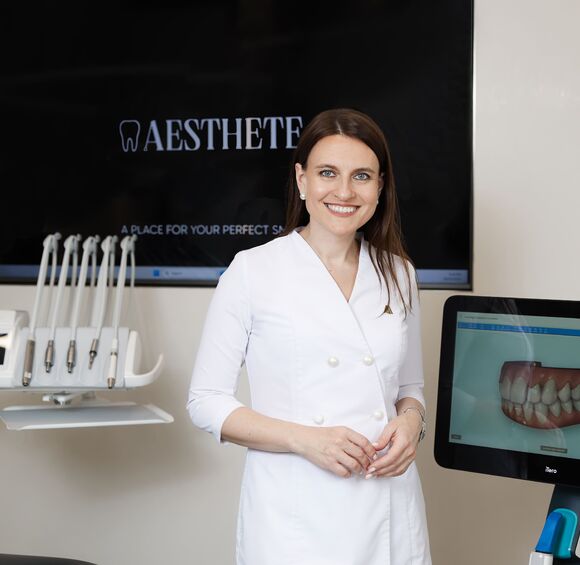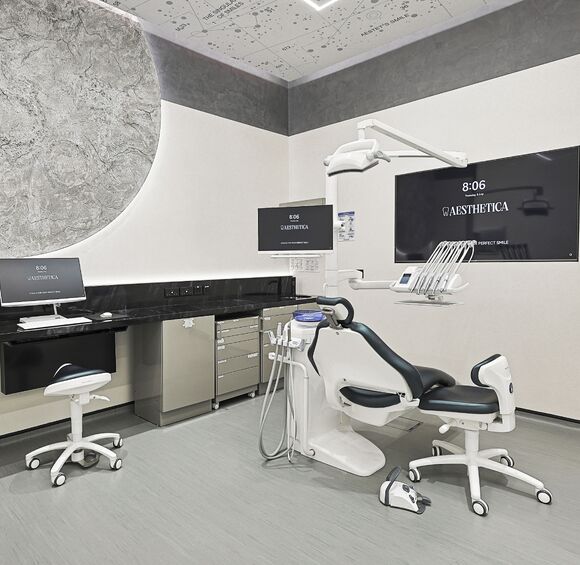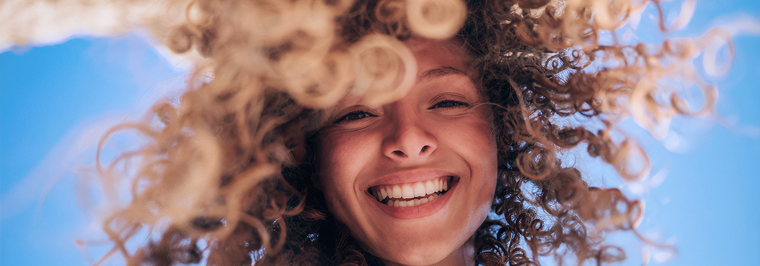One of the complications after dental implant placement can be periimplantitis — inflammation of the tissues surrounding the artificial roots. The inflammatory process is caused by pathogenic bacteria. For prevention, the doctors at AESTHETE Dental Clinic prescribe antibiotics. It is important to take the prescribed medication for the duration specified by the dentist.
Why are antibiotics needed?
The need for antimicrobial or antibacterial drugs before dental implantation depends on the clinical situation. In many cases, when only one implant needs to be placed, antibiotics may not be required after the procedure.

However, the placement of artificial tooth roots is a surgical intervention, which puts strain on the body. Pathogenic bacteria can enter the tissues surrounding the implant. Initially, mucositis develops — inflammation of the soft tissues. If not addressed, it can progress to periimplantitis, which affects the bone tissue. As a result, the fixation of the artificial root may weaken, and it may need to be removed and reinstalled.
Therefore, to minimize the risk of such complications…
Oral surgeons prescribe antibiotic therapy in the following situations:
- Weakened immune system
- Poor oral hygiene
- Gingivitis, periodontitis, periodontosis
- Diabetes
- Tonsillitis, rhinitis, and other similar ENT diseases
- Saliva entering the implant site during the procedure
- Extensive implantation, where the doctor places several artificial roots
- Immediate implantation — during such procedures, the implant is placed immediately after tooth extraction, which increases the risk of tissue infection
- Bone grafting
- Unexpected complications arising during surgery
Antibiotics are recommended for smokers.Regular nicotine use weakens the immune system, can cause excessive or insufficient weight gain, and increases the risk of cardiovascular diseases. All of these factors, after dental implant surgery, raise the chance of inflammation.
Statistics show that the probability of wound infection during dental implant placement reaches 10-15%. This can happen even with strict adherence to surgical protocols, as pathogenic bacteria are always present in the oral cavity to some extent. However, taking antibiotics reduces the risk of inflammation to about 1%.
Which antibiotics should be taken before or after implantation?
The list of medications, dosage schedule, and duration of treatment are determined by the doctor based on the patient's individual characteristics. If necessary, the doctor may order tests. The analysis of the oral cavity's microflora helps identify which medications are required in a specific case.
Antibiotic therapy can be:
- Systemic — medications in the form of tablets or powders that need to be taken orally.
- Local — the doctor prescribes creams or gels that should be applied to the wound or inflamed area.
For greater effectiveness, the doctor may also prescribe:
- Pain relievers — to alleviate pain that the patient may feel once the anesthesia wears off.
- Antihistamines — to reduce the risk of an allergic reaction.
- Angioprotectors and microcirculation correctors — to improve bone and tissue metabolism in the area of the surgical site.
- Vitamin and mineral complexes — to boost overall immunity.
The prescribed medications must be compatible with each other. This is why it is crucial for an experienced doctor to handle the prescriptions. Self-treatment or self-prescription of a course of antibiotics or other medications is strongly discouraged.
Recommendations during antibiotic treatment
It is possible to shorten the postoperative rehabilitation time and reduce the likelihood of complications to a reasonable minimum. To achieve this, it is enough to strictly follow the instructions of the treating physician, including those related to antibiotic therapy.
Strictly follow the prescribed regimen by the doctor
You must take the medications prescribed by the doctor and follow:
- dosage;
- frequency;
- duration of the course;
- additional requirements: for example, some medications are taken before meals, while others — after.
You should continue taking antibiotics even if there are no visible signs of complications. If you stop taking them too early, the course may not be effective enough, and inflammation may start. Failure to follow the dosage could lead to dysbiosis or allergies.
Medications in tablet form should be taken with water. If another liquid is used, it may affect absorption, and the result may differ from what is expected.
Do not consume alcoholic beverages
Antibiotics and alcohol are incompatible. Alcoholic beverages increase the likelihood of swelling and tissue inflammation, slow down the healing process and osseointegration. Combining antibiotics and alcohol can lead to liver damage. Possible side effects include disturbances in the functioning of the central nervous system, heart, and stomach.
Ethanol, which is present in alcoholic beverages, may interact with some components of painkillers, leading to nausea, dizziness, and increased blood pressure.
Nutrition should be balanced
During antibiotic treatment, you should exclude from the diet:
- fatty foods — they delay medications in the stomach, so they reach the intestines after partially losing their beneficial effect;
- fried dishes, smoked products — they increase the load on the liver;
- excessively salty foods — they may additionally provoke swelling.
You should include in your diet:
- foods high in fiber;
- kefir, yogurt, and other fermented dairy products — they help restore gut microbiota and normalize digestion.
It is also important to drink at least two liters of water per day.
Do not take generics
You must take only original medications. Do not save money by purchasing so-called generics: medications with similar pharmacological effects released by other manufacturers. Often, they have a lesser effect and cannot prevent periimplantitis or other complications.
Sports and physical activities
It is important to avoid excessive physical exertion for several days after implantation. This applies to sports training, workouts at the fitness club, and various tasks that require muscle strain. Due to increased physical activity, swelling and bleeding may occur and take a long time to subside. This can lead to slower healing of the postoperative wound.
After 3-4 days post-surgery, if all is well, you can transition to moderate physical activities. However, you should train and lift weights only after completing antibiotic therapy. You can discuss these matters with your doctor, especially if you are a professional athlete. They might suggest an alternative solution.
What to do in case of complications and side effects
Taking antibiotics can be accompanied by side effects. These medications can disrupt the normal gut microbiota, leading to digestive issues.
Common side effects include:
- Dysbiosis, which disrupts normal food digestion, causes constipation or diarrhea, and makes it difficult to absorb nutrients;
- Allergy, manifested as skin rashes, redness, or itching;
- Mycosis — a skin infection caused by pathogenic fungi;
- Severe nausea;
- Shortness of breath.
If you notice any signs of these effects, be sure to inform your treating physician. They will suggest a solution. For example, in case of dysbiosis, taking probiotics might be beneficial.
A balanced diet, avoiding fatty foods and fried dishes, and consuming an adequate amount of water reduce the likelihood of complications that could hinder the normal functioning of the digestive system.
AESTHETE Dental Clinic is located in Dubai (UAE), on Bluewaters Island. We provide dental implantation services, utilizing advanced techniques and premium implants. Our doctors strictly adhere to surgical protocols. When necessary, we prescribe antibiotic therapy tailored to the individual characteristics of the patient and monitor antibiotic intake to avoid complications.
Questions and Answers
How long should I take antibiotics?
The duration of antibiotic therapy is determined by the doctor, usually ranging from 3 to 7 days, and in rare cases, up to 10-14 days. You must take the medications for the prescribed time, in the prescribed dosage, and at the prescribed intervals as indicated by the dentist. This should be done even if the patient does not experience swelling, pain, or visible signs of inflammation.
Why do I experience headaches after implantation?
The body cannot fail to react to the surgeon's actions. The more implants need to be placed, the more pronounced the reaction will be. Pain and discomfort after surgery are normal and typically subside after a few days. However, if the pain persists or worsens, you should inform your doctor.
I have increased saliva production after dental implantation. Is this normal?
This is generally a natural physiological response. Over time, everything returns to normal, and the excessive salivation stops. However, it may also be a result of nerve damage. In this case, additional symptoms may occur, such as pain in the affected area, burning, or numbness of part of the tongue.
I have a fever after dental implant placement. What should I do?
It is normal to have a temperature rise immediately after implantation. It may reach 38°C (100.4°F) or slightly higher. Over time, it should gradually decrease, usually within 2-3 days. During this period, you can take antipyretic and pain-relieving medications. However, if the fever remains high for more than 3-4 days, you should contact your doctor, as this could indicate the onset of an inflammatory process.
Referense
- Misch C. Dental Implant Prosthetics. 2nd ed. Elsevier Health Sciences; St. Louis, MO, USA: 2015.
- Ahmad N, Saad N. Effects of antibiotics on dental implants: a review. J Clin Med Res. 2012;4(1):1-6.
- Gynther GW, Köndell PA, Moberg LE, Heimdahl A. Dental implant installation without antibiotic prophylaxis. Oral Surg Oral Med Oral Pathol Oral Radiol Endod. 1998;85:509–11.














